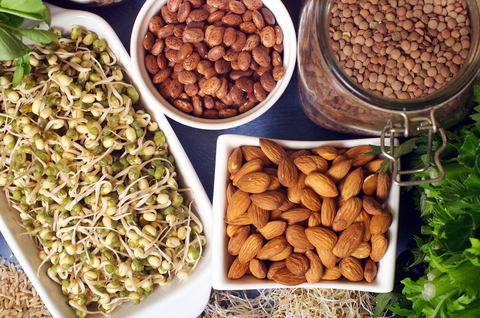Plant-Based Proteins to Add to Your Diet
Here is a comprehensive guide to to 8 plant-based proteins and how to use them daily! “So where do you get your protein?” is probably one of the most common questions those practicing a plant-centric lifestyle get, and now you can supply them with all this knowledge and say, “Here!”. Keep reading for the top 8 sources of plant based protein and how to incorporate them into your diet.
Quinoa
This gluten-free grain is used mainly as a carbohydrate. It is considered to be a starchy protein due to its rich content of protein, fiber, and carbohydrates. Add quinoa to raw or cooked vegetables, use a substitute for rice, and even as a cereal by adding fresh fruit and milk.
Lentils
Lentils are a great source of protein, as well as fiber and carbohydrates. Just 1 cup of cooked lentils contains 18 grams of protein. It can be cooked with your favorite seasonings or eaten plain by itself. You can make lentils into soups, top on salads, combine with quinoa or rice for a hearty meal, use as a substitute for meat filling, and even make veggie burgers from lentils.
Seeds
Seeds such as sesame, chia, sunflower, flax, hemp, and pumpkin seeds are all mineral and protein rich. As seeds vary, some are nuttier in flavor while others are neutral and sweet tasting. Sesame seeds have a very nutty taste, pumpkin seeds carry an earthy flavor, chia and flax seeds are mildly nutty, and sunflower seeds are just slightly nutty and sweet. Nutrition-wise ¼ cup of seeds contains around 7-9 grams of protein.
Use seeds to the sprinkle on the top of any meal or salads to increase the protein and healthy fat content. You can grind seeds to use as a flour substitute for gluten-free baking and use in snacks, desserts, raw bars, and truffles.
Spirulina
Spirulina is rich in protein with a nutty taste for a nutritious addition to any meal. Just two tablespoons of spirulina contain 8 grams of protein. You can add spirulina to smoothies, desserts, and snacks for an added boost.
Nutritional Yeast
This staple food item is versatile, rich in B-vitamins and protein. Its cheesy flavor is great for making dressings, dairy-free sauces and more. You can add nutritional yeast to water or almond milk for a healthy sauce or dressing. Sprinkle on top of quinoa, beans, lentils, hummus and salads for a delicious flavor.
Nuts
Nuts such as Brazil nuts, cashews, pistachios, walnuts, and almonds are rich in protein, omega-3, vitamin E, and minerals. As the taste varies, some are sweet or nuttier than others. Sprinkle nuts onto any meal or salad, use in baked goods, nourishing muesli and granola. Nuts go great with cold cereals, oatmeal, and porridges for extra protein and crunch. You can also make your preservative- and additive-free nut butter for a great spread.
Beans
Beans are rich in fiber, carbs, and protein. You can cook beans with seasonings or eat plain. Beans make a great vegetarian substitute to taco filling, meatballs, and burgers and loaf. Add beans with quinoa or rice for a hearty meal.
Soy
Soy foods such as tofu, edamame, and tempeh contain protein, amino acids, fats, and fiber. Tempeh is the most nutritious source of soy as it contains healthy bacteria from the fermentation process. Add soy foods as topping to salads, stir-fry meals, sauces, fillings, and even marinate tofu for a simple, healthy dish.
Let us know if you like this list of Plant-Based Proteins by leaving a message.
Request a complimentary first session at Vertex Fitness, Voted the BEST Personal Training Studio on the Main Line
Click HERE and we will schedule a session to try it yourself
Complimentary First Workout Session



Leave a Comment